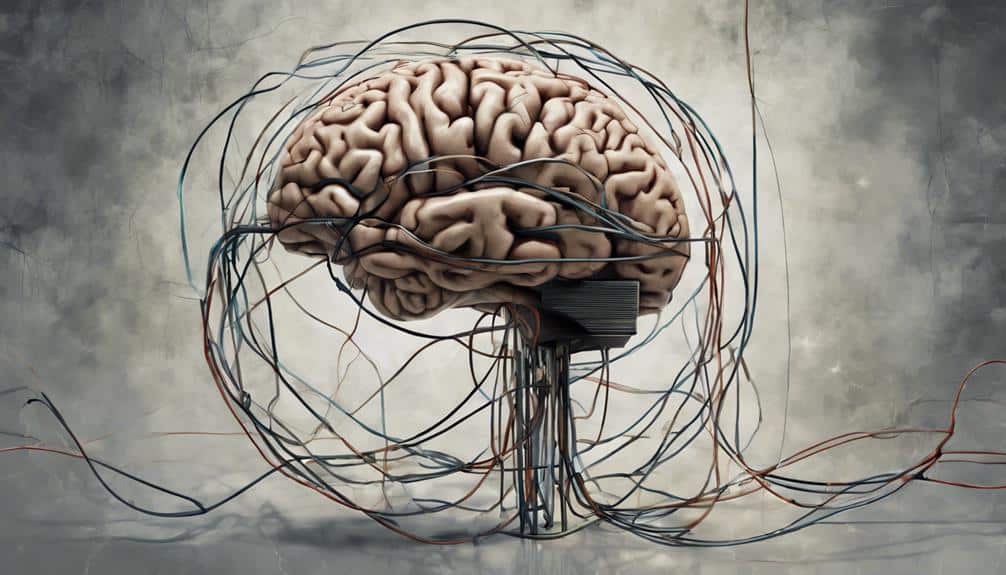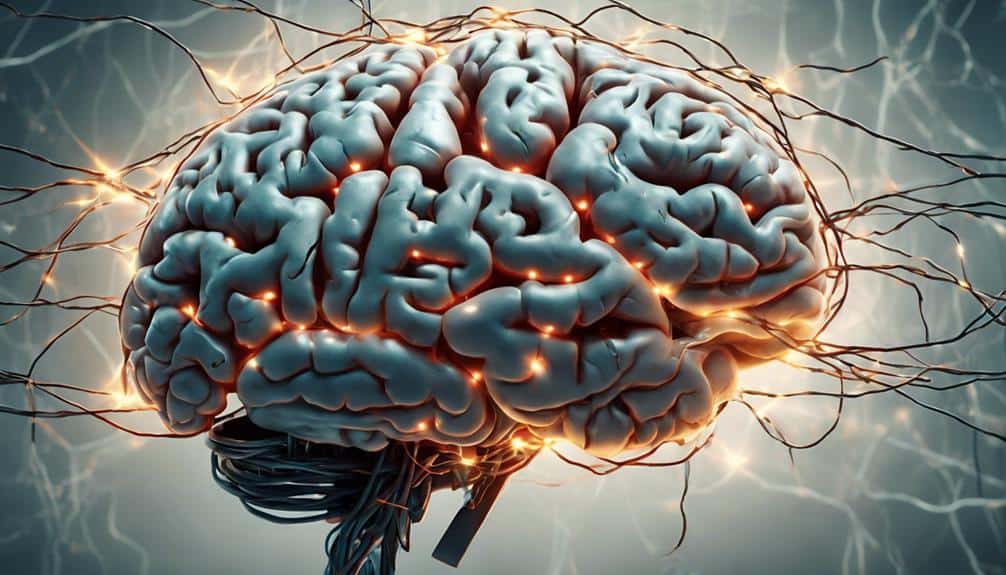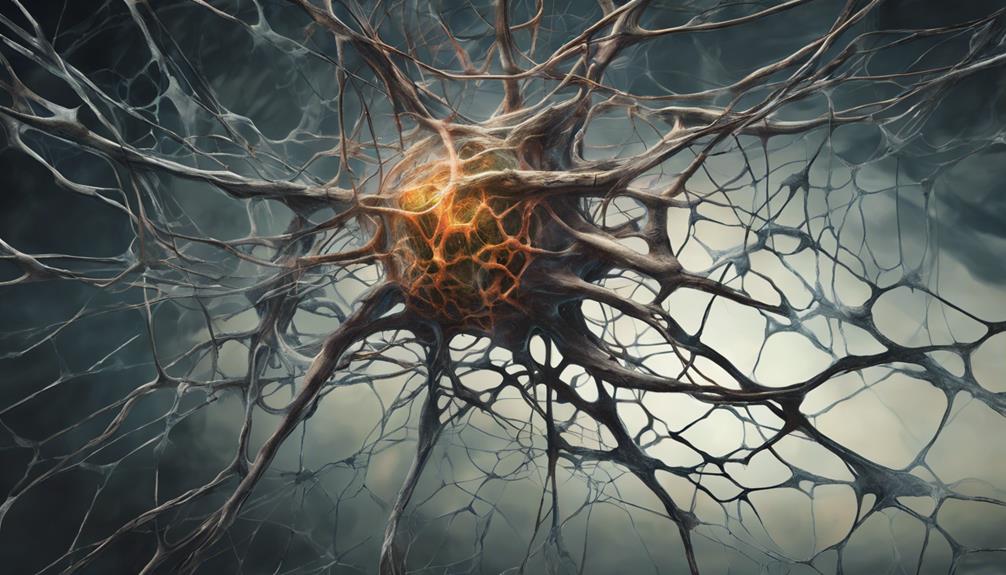Is Ptsd Neurodivergent
As I navigate the intricate web of the brain, envision the neural pathways that PTSD can alter, leading to a complex array of responses and behaviors.
The question arises: Is PTSD truly neurodivergent? The answer lies in dissecting the nuances of its impact on cognitive functions and emotional regulation, sparking a conversation that challenges traditional definitions.
Join me as we explore the depths of this debate, uncovering insights that may reshape our understanding of PTSD and its place within the domain of neurodivergence.
Key Takeaways
- PTSD exhibits acquired neurodivergences post-trauma.
- Trauma alters brain function and cognitive patterns.
- Neurological changes impact cognition and emotional regulation.
- Memory challenges and altered future orientation are common in PTSD.
Understanding Neurodivergence

In studying neurodivergence, one explores the diverse manifestations of unique brain functions that depart from the typical norm. Neurodivergent individuals, including those with conditions like PTSD, exhibit a wide range of cognitive patterns and processing styles that require tailored support.
PTSD, a condition often resulting from traumatic experiences, can be considered neurodivergent due to the alterations it can bring to brain function and behavior. Symptoms associated with PTSD, such as intrusive memories, hypervigilance, and emotional dysregulation, highlight the neurological differences present in affected individuals.
Understanding the neurodivergent nature of PTSD is vital in providing appropriate support and accommodations to those exploring the aftermath of trauma. By recognizing the neurodiversity within conditions like PTSD, society can create more inclusive environments that acknowledge and respect the unique needs and strengths of individuals with varying brain functions.
Ultimately, fostering a deeper understanding of neurodivergence can lead to more effective strategies for supporting those with conditions such as PTSD.
PTSD: A Brief Overview

PTSD, or Post-Traumatic Stress Disorder, is a mental health condition stemming from traumatic experiences, often leading to symptoms like flashbacks and severe anxiety.
The effects of PTSD on brain structures such as the amygdala and hippocampus can alter fear and stress processing.
Understanding the neurological impact of PTSD is important in addressing this serious mental health issue.
PTSD Symptoms Explained
Symptoms of post-traumatic stress disorder (PTSD) manifest through flashbacks, nightmares, severe anxiety, and intrusive thoughts, greatly impacting daily functioning. These symptoms often arise following a traumatic event and can persist for an extended period, leading to a formal PTSD diagnosis.
The presence of intrusive thoughts, where distressing memories intrude into daily life, is a hallmark of the condition. Research suggests that alterations in brain structures like the prefrontal cortex, amygdala, and hippocampus are linked to the development and persistence of PTSD symptoms.
The severity of these symptoms can vary widely, from mild to severe, profoundly affecting an individual's well-being and mental health. Diagnostic tools such as the CAPS-5 test help clinicians assess PTSD symptoms and their impact on individuals.
Neurodiversity and PTSD
Following the impact of trauma on brain structures and cognitive functions, the intersection between neurodiversity and PTSD becomes increasingly evident. Traumatic experiences can result in acquired neurodivergences, manifesting as changes in executive function, emotional regulation, and intrusive memories. These alterations align with characteristics often observed in neurodivergent individuals.
Those with PTSD may exhibit challenges akin to executive dysfunction, sensory sensitivity, and heightened anxiety, resembling traits found in neurodivergent populations. Individuals with PTSD and neurodivergence may face similar societal obstacles, highlighting intersecting forms of oppression. Recognizing the overlap between PTSD and neurodivergence is essential for tailoring effective support to address trauma-related neurodivergent symptoms.
Understanding these parallels can lead to improved interventions and assistance for individuals maneuvering the complexities of PTSD and neurodiversity.
The Debate: Is PTSD Neurodivergent?

Debates surrounding the neurodivergent classification of PTSD persist within the scientific community due to its complex impact on brain functions and structures.
- PTSD can be considered neurodivergent as it affects key brain regions such as the amygdala, hippocampus, and prefrontal cortex.
- Research suggests that PTSD induces changes in brain structures and functions, potentially resulting in atypical brain functioning.
- However, debates arise regarding PTSD's classification as neurodivergent due to its temporal nature and the possibility of resolution with treatment.
- Understanding the neurological changes associated with PTSD is essential for developing effective treatment and support strategies.
The ongoing discussion on whether PTSD should be labeled as neurodivergent continues to advance, considering its profound effects on brain function and mental well-being. Clarifying the intricate relationship between PTSD and neurodiversity is essential for improving interventions and support systems for individuals experiencing PTSD.
PTSD and Neurological Changes

The impact of PTSD on brain regions such as the amygdala, hippocampus, and prefrontal cortex highlights significant changes in fear and stress processing. Research has shown that individuals with PTSD often exhibit alterations in these brain structures, affecting how they perceive and respond to fear-inducing stimuli. These neurological changes can influence various aspects of cognition and emotion regulation, leading to symptoms like hypervigilance, intrusive memories, and heightened anxiety.
Additionally, the modifications in brain regions associated with PTSD can impact decision-making processes. The prefrontal cortex, responsible for executive functions like decision-making and impulse control, may function differently in individuals with PTSD. This alteration could contribute to difficulties in making sound judgments or regulating emotions effectively.
Understanding these neurological changes is crucial for developing targeted interventions that address the specific brain mechanisms affected by PTSD. By pinpointing how PTSD alters the brain's functioning, clinicians can tailor treatment approaches to mitigate the neurological impacts of the disorder and enhance overall recovery outcomes.
The Temporal Aspect

The temporal aspect of PTSD is vital in understanding its impact on individuals.
Time perception disruptions, memory retrieval challenges, and difficulties in future orientation are key components to take into account.
These aspects contribute to the unique nature of PTSD compared to other neurodivergent conditions.
Time Perception Impact
Research suggests a significant temporal impact on individuals with PTSD, influencing their perception of time following traumatic events. This aspect reveals an essential dimension in understanding the neurodivergent characteristics of PTSD.
Here are key points to ponder:
- Time Perception Distortion: PTSD can lead to distortions in how time is subjectively experienced.
- Neuroplasticity in Response to Trauma: The brain changes associated with PTSD may be temporary, indicating a dynamic rather than fixed neurodivergent state.
- Temporal Symptoms: Individuals with PTSD may exhibit symptoms like flashbacks or time disorientation.
- Therapeutic Interventions: Treatment addressing time perception issues can have a significant impact on symptom resolution, offering hope for recovery.
Understanding the interplay between time perception and PTSD is essential for comprehending the condition's neurodivergent aspects.
Memory Retrieval Challenges
Following the temporal impact of PTSD on time perception, the challenges in memory retrieval associated with this condition reveal significant complexities. Memory retrieval in PTSD can be marked by difficulties in recollecting specific details of traumatic experiences. The temporal aspect of PTSD may disrupt memory consolidation and retrieval processes, resulting in fragmented or distorted recollections.
Individuals with PTSD often struggle with intrusive memories or flashbacks, influencing the accuracy of memory retrieval. These challenges may present as memory gaps, dissociative amnesia, or heightened emotional responses during recall. The temporal nature of PTSD further complicates memory accessibility and clarity, highlighting the intricate relationship between past trauma and present experiences.
The interplay of traumatic memories and their temporal aspects underscores the intricate challenges faced by individuals with PTSD.
Future Orientation Difficulties
Experiencing future orientation difficulties in PTSD can profoundly impact an individual's ability to envision and plan for upcoming events.
Key Points:
- Challenges: Individuals with PTSD may struggle to envision a positive future, set long-term goals, and maintain hope.
- Therapeutic Approach: Trauma-focused therapy aims to address these difficulties by processing past traumas and fostering feelings of safety and control.
- Implications: Impaired future orientation can contribute to feelings of uncertainty, hypervigilance, and difficulty engaging in future-oriented thinking.
- Recovery: Addressing future orientation difficulties in PTSD treatment is essential for promoting recovery, resilience, and the capacity to envision a fulfilling future despite past traumas.
An Evolving Discussion

In the ongoing discourse surrounding PTSD's potential classification as neurodivergent, emerging perspectives shed light on the complexities of this evolving discussion. Some experts argue that PTSD may fit under the neurodivergent umbrella due to its significant impact on key brain structures like the amygdala, hippocampus, and prefrontal cortex. Research indicates that individuals with PTSD can exhibit changes in brain regions associated with emotions, memory, and decision-making processes.
The intersection of PTSD and neurodivergence raises questions about the treatment approach for individuals experiencing these conditions. While PTSD is often triggered by traumatic events and can be resolved with appropriate interventions, the debate around its classification as a lifelong neurodivergent condition persists due to its crucial nature. Understanding this intersection is vital in mental health to provide tailored support and interventions for those affected by PTSD.
As the discussion evolves, further research and clinical insights will likely contribute to a more nuanced understanding of the relationship between PTSD and neurodivergence.
Final Thoughts

As we conclude the examination of PTSD's potential classification as neurodivergent, it becomes evident that defining its status within this framework remains a nuanced and evolving endeavor. When considering the interplay between traumatic experiences, brain structures, and the concept of neurodivergence, several key points emerge:
- PTSD is often viewed as an acquired neurodivergence stemming from specific traumatic events rather than a lifelong neurodivergent condition.
- Changes in brain structures and functions associated with PTSD may exhibit a degree of reversibility, setting it apart from more static neurodivergent conditions.
- Arguments supporting the classification of PTSD as neurodivergent highlight the alterations in brain regions like the amygdala, hippocampus, and prefrontal cortex.
- The neurodiversity discourse expands to encompass discussions on PTSD and complex PTSD (cPTSD) as forms of acquired neurodivergence, emphasizing the need for tailored support and interventions to address the unique challenges faced by individuals with these experiences.
Frequently Asked Questions
Is Cptsd a Type of Neurodiversity?
Yes, CPTSD, a trauma response, can align with neurodivergent perspectives due to challenges in emotional regulation and executive functioning. Accepting CPTSD as part of neurodiversity enhances support for those handling its complexities based on personal experiences.
What Mental Illness Are Considered Neurodivergent?
Mental illnesses like autism, ADHD, bipolar disorder, schizophrenia, and OCD are recognized as neurodivergent conditions. Autism acceptance, ADHD awareness, bipolar understanding, combating schizophrenia stigma, and dispelling OCD misconceptions are important for promoting neurodiversity awareness and support.
What's the Difference Between PTSD and CPTSD?
The difference between PTSD and CPTSD lies in the nature of trauma experienced. CPTSD results from prolonged exposure, leading to more severe symptoms affecting emotional regulation, self-concept, and relationships. Therapeutic interventions focus on complex trauma processing and resilience building.
Is Complex PTSD a Disability?
Yes, complex PTSD can be considered a disability due to its severe impact on daily functioning. It may require workplace accommodations, impact relationships, face social stigma, need treatment options, and affect overall quality of life.
Conclusion
To summarize, while the debate on whether PTSD is considered neurodivergent continues, the evidence of its impact on brain regions can't be ignored. Like a storm passing through a forest, PTSD can leave lasting changes in its wake, affecting emotions, memory, and decision-making.
Understanding the intersection between PTSD and neurodivergence is vital for providing tailored support and interventions for individuals facing these challenges. The evolving discussion on this topic highlights the need for continued research and awareness in mental health.






